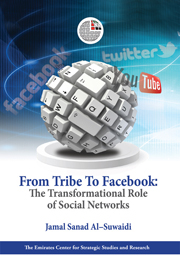Book contents
- Frontmatter
- Contents
- Acknowledgments
- Introduction
- Keywords
- Scope of the Study
- Previous Studies
- Social Networks: Concept and Role
- Statistical Indicators of Main Social Networks
- The Social Networking Age
- Data-entry Potential of Social Networks
- Impact of Social Networks
- Prospects for the Relationship between Traditional Media and Social Networks
- Legal Problems Associated with the Use of Social Networks
- Social Networks: Future Prospects
- Conclusion: Various Future Prospects
- Notes
- Bibliography
- Index
Conclusion: Various Future Prospects
Published online by Cambridge University Press: 05 September 2014
- Frontmatter
- Contents
- Acknowledgments
- Introduction
- Keywords
- Scope of the Study
- Previous Studies
- Social Networks: Concept and Role
- Statistical Indicators of Main Social Networks
- The Social Networking Age
- Data-entry Potential of Social Networks
- Impact of Social Networks
- Prospects for the Relationship between Traditional Media and Social Networks
- Legal Problems Associated with the Use of Social Networks
- Social Networks: Future Prospects
- Conclusion: Various Future Prospects
- Notes
- Bibliography
- Index
Summary
Some researchers liken the ramifications of globalization to an earthquake, referring to fault lines along which pressure increases or decreases depending on the manifestations of globalization—such as migration and displacement. Similarly, successive quality enhancements on social networks – a manifestation of cultural and technological globalization – comprise earthquakes of their own, fuelled by prevailing issues and perceptions of concepts of citizenship, the state, and media responsibility, etc.
Social networks have produced a new dynamism among cyber-activists who raise issues of concern to users and who were previously dissuaded from political activism either by the threat of harassment from security services or simply through frustration born of a lack of genuine opportunities for change.
Other manifestations and behavioral patterns associated with social networks include groups of cross-border information technology specialists, who work in virtual space, offering voluntary services to support users of social networks in other countries and protect their identities by facilitating information exchanges. Members of these groups work to ensure the freedom to use social networks, and they are similar in character to organizations that specialize in defending the rights of specific professionals (such as Reporters Without Borders, etc.)
Various different patterns of social relations have emerged alongside a broad range of uses of social networks – from shopping and politics, to entertainment and the spread of cultural and artistic awareness. It is easy to take social networks for granted, and it is likely that alternatives will appear; however, it is not easy to go so far as to construct detailed future scenarios detailing patterns of structural change—foreseeing the future is risky for academics and specialists, particularly in scientific communities that prize certainty.
- Type
- Chapter
- Information
- From Tribe to FacebookThe Transformational Role of Social Media, pp. 117 - 130Publisher: Emirates Center for Strategic Studies and ResearchPrint publication year: 2013



